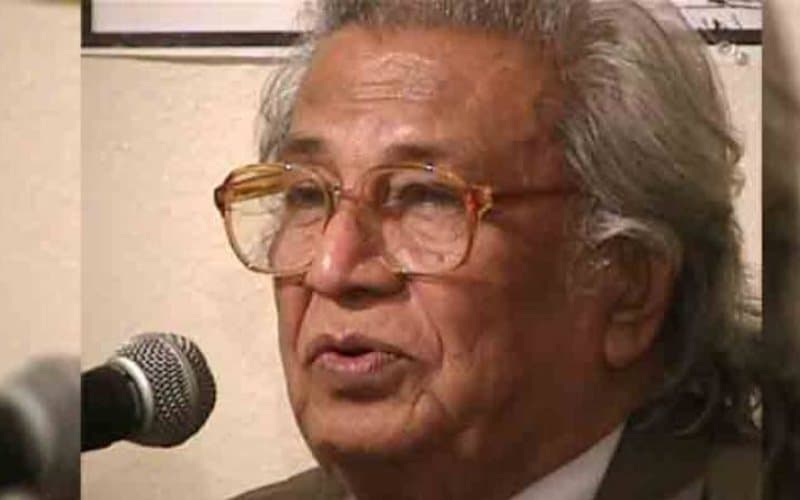Toronto/Hyderabad: Celebrated Urdu poet and song writer Himayat Ali Shair of Pakistan passed away on Tuesday in Toronto, Canada, after a prolonged illness.
Ninety-three-year-old Shair was born on July 14, 1926 in Aurangabad, then a part of Princely State of Hyderabad. He moved to Hyderabad City in 1940s and migrated to Karachi in early 1950s.
While in Hyderabad he became an active member of the Progressive Writers Movement.
Himayat Ali Shair was living with his children in Canada for a long time. According to his relatives and friends in Hyderabad and Aurangabad he was suffering from Alzheimer’s disease.
Numerous of his songs written for films went on to become instant hits and are remembered widely.
Pakistani government honoured him with the Pride of Performance Award for his contribution to the promotion of arts in 2002. He was also given the Nigar Award for his work to the world of movies.
According to information reaching here, he suffered cardiac arrest and passed away quietly. He would be buried in Toronto, reports said.
Himayat Ali Shair’s collection of poetry includes Mitti Ka Qarz, Tashnagi Ka Safar, Haroon Ki Awaz, which received Allama Dr Muhammad Iqbal Award and “Harf Harf Roshni.”
Several of his songs written such as Na Chura Sakogay Daaman and Jaag Utha Hai Sara Watan went on to become instant classics.
Owing to some family problems he had moved to Hyderabad. He began his professional career at Hyderabad Radio. He sold newspapers as a mark of protest when he was removed from the radio service. He later migrated to Pakistan. In 1956, he penned his first book, titled Aag Main Phool and received the Presidential Award for his work in 1958, just two years later.
Films with his work include Jab se Dekha hai Tumhe, Dil ne Tujhe maan liya, Daaman, Ek tera Sahaara, Kaneez, Mairay Mehboob, Tasveer and Khilona and others.
He became known as one of the leading Urdu poet, film song writer and radio artist.
Nurul Hasnain, his cousin and an acknowledged writer who lives in Aurangabad, said that the entire family went into gloom when the news of his death reached there.
He said his father was a sub-inspector of police in the Nizam’s State. “As a child he asked his father the meaning of Zille Ilahi, a title by which the Nizam was also known. His father said it means, ‘the shadow of God.’ To which Shair asked how could a king be the shadow of God? Instead of any further explanation he received beating from his father,” Nurul Hasnain said over phone.
He described him as a revolutionary who tried his luck as a song writer with the film world in Mumbai. Even as he was getting a break there, he decided to visit Pakistan. There too he wrote a few songs which became instant hits. He was persuaded by his friends not to go back to India as he could be tried for working in Karachi for films. He decided to stay back.
According to noted Indian humour writer Mujhtaba Hussain, Shaer took to education in Karachi and after his post graduation started teaching there.
He first returned to New Delhi as an invitee poet for Shankar Shaad Mushaera (gathering of poets) somewhere in 1980s. Since then he was invited by numerous cultural organizations in Hyderabad, Mumbai and other cities.
He is the inventor of ‘Salasa’, a kind of poetry where three lines are used as against a two-line couplet. He was hugely popular in the Urdu circles of U.S. and Europe and Middle East. “He was a wonderful human being,” Hussain said.

